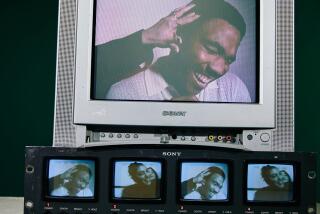‘Mad Men’ recap: Don sells out for cigarettes
On “Mad Men,” a cigarette is never just a cigarette.
Since the opening minutes of the series pilot, “Smoke Gets in Your Eyes,” cigarettes have played an almost totemic role in the life of Don Draper. Not the ones everyone’s smoking -- those are more atmospheric -- but, rather, the ones our protagonist is shilling. The very first moment we met him, Don was in a bar scribbling ideas on a cocktail napkin for Lucky Strike, a client he’d go on to win with a pitch about its “toasted” tobacco but lose years later after starting his own firm, then publicly denounce in a manipulative open letter in the New York Times.
All along, Don is well aware of the dangers of cigarette smoking, but he orchestrates campaigns that promote their use and obfuscate their health risks. Cigarettes represent not just everything that’s corrosive about his chosen career path but his chronic tendency toward deception and secrecy. Which is why it’s not exactly a moment of triumph when he shows up, uninvited, to Jim and Lou’s secret pitch meeting with Philip Morris. Yes, he seems to win them over by boasting of his insider knowledge of Lucky Strike’s strategy, but there’s also something grossly self-flagellating about the whole thing.
“I just keep thinking what your friends at American Tobacco would think if you made me apologize. Forced me into your service. They are still your competition, aren’t they?” he asks.
While there is a tiny -- infinitesimal, really -- part of me that’s excited to catch a glimpse of the old Don magic again, I’m mostly just repelled at his willingness to sell himself out, to revoke one of signature accomplishments, all for the sake of reclaiming his throne at an agency that doesn’t want him. I’m reminded of the pitch he made to Dow Chemicals in Season 5’s “Commissions and Fees,” in which he made napalm sound about as harmful as an antacid tablet (“When America needs it, Dow makes it -- and it works”) and defined happiness as the “moment before you need more happiness.”
This time around, Don is more subdued, less obviously bloodthirsty (he’s not even foaming at the mouth!), and the ugly, unbridled greed of that moment has been supplanted by a sad desperation to win back his job -- a sad desperation shared by his wife.
In a bid as transparently desperate as Don’s overture to Philip Morris, Megan offers up her irritating friend Amy for a threesome with her hubby. A reluctant Don obliges, but the menage a trois lacks the sort of scintillating thrill a similar encounter would have had a few seasons ago. It’s not sexy so much as a little sad, and you get the sense that even Don is just going through the motions (it was awful for him, I’m sure). The next morning, Don and Megan look tired and hungover, and Amy nervously bolts for the door. Free love sure can be awkward.
The sordid threesome comes after a string of ugly behavior from Megan that starts when Stephanie shows up, looking both filthy and radiant in her flower-child garb, looking for help. Megan kindly -- and sincerely, I think -- offers her a warm shower and a carnivorous meal. What’s startling is how quickly she turns against her guest, after a throwaway comment about knowing all of Don’s secrets. Driven by jealousy of Stephanie’s emotional intimacy with Don -- she’s the only person alive who still calls him Dick -- Megan snaps, dispatching her guest with a $1,000 check and the completely disingenuous claim that Don wouldn’t approve of Stephanie’s “disorganized” circumstances. (Megan’s embarassed by her husband’s money, except when it comes in handy.)
We’ve seen Megan act petulantly (orange sherbet, anyone?) and manipulatively (using Don to finagle an audition for Butler shoes), but I don’t think she’s been this cruel before, casting out the closest thing Don has to family (other than his children) out of jealousy. It’s interesting how, for all their differences, Megan and Betty revert to almost the same tactics when they feel their marriage is under siege -- brazenly flirting with other men, taking their frustrations out on the vulnerable and masking their insecurities with sexual adventurousness.
With her enormous hair and wild Pucci mini-dress, Megan is even visually reminiscent of the Betty we briefly met on the Drapers’ trip to Rome in the waning days of their marriage -- the last time she used those Italian language skills she’s so proud of. That’s not to say that Megan and Betty are really that much alike, only that being married to Don Draper has a way of bringing out a woman’s cruel, petty side. Don fell for Megan because she was kind and open-hearted, and after four years of marriage she’s turned into a jealous shrew, albeit one with groovy friends open to a little swinging.
Kicking out Don’s pregnant, hungry quasi-niece is exactly the sort of spiteful thing Betty would have done in her first marriage -- and, let’s be honest, would probably still do now. In her latest incarnation, Betty has transformed into a monstrous political wife, one a little too thrilled with the reflected glory of her husband’s mildly successful career (note the humble bragging about how nervous Henry’s constituents are around her). In some ways, Betty was born to play her current role, which plays both to her vanity and to her insecure dependence on men.
Unfortunately, her relationship with Henry is souring quickly. Betty has always chafed at the limitations of her domestic role yet also defined herself by them. We can see both impulses at work in this episode when she literally insists on staying in the kitchen just to spite her husband. She loves the attention and prestige that comes with being Henry’s wife, yet resents how she is required to censor herself. I might be sympathetic with Betty’s desire to be more outspoken if it seemed to derive from genuine conviction. Instead, her anger has more to do with Henry’s failure to live up to her ideal of a loyal Republican husband.
You can practically see steam billowing out of her ears when he expresses mild reservations about the cost of the Vietnam War, which she supports unreservedly. Betty is about image and facade, and there’s little room for nuance or complexity in her fantasy. That’s why she’s irate, rather than concerned, when Sally comes home with a broken nose. “Don’t worry about me finding a man. I already have you to keep me in line,” says Sally, who has a laser-like ability to target her mother’s most acute insecurities (but who, it should be noted, has really evolved into a kind and loving older sister).
Before I go, I’d like to hold a moment of silence for Michael Ginsberg’s right nipple, sacrificed on the altar of commerce along with Guy MacKendrick’s right foot and Ken Cosgrove’s right eye. (Always the right appendage -- what could it mean?) In the grand “Mad Men” tradition of on-the-job maiming, a deranged Ginsberg slices off his nipple, like a latter-day Van Gogh, and gives it to Peggy in a gift box. Aww, who says this show isn’t romantic?
In the run-up to The Nipple Incident, it’s clear Ginsberg is suffering some kind of mental breakdown, one that he blames on the constant drone of the new computer. What’s really triggering his condition is unclear: Ginsberg has always been a bit, shall we say, loopy, and frankly we don’t know him well enough as a character to really understand what’s going on inside his head. (I mark his arrival as the beginning of “Mad Men’s” too-many-characters-to-care-about problem.) For most of the episode, Ginsberg’s unraveling is played for laughs, particularly the scene when he shows up at Peggy’s apartment unannounced and wonders about her “interesting arrangement” with Julio. (Please, television gods, bring us a spinoff with Peggy and Julio. It’s all I ask.)
But our laughter is tempered with discomfort, because even before he slices off his nipple like one of Daenerys Targaryan’s slaves, it’s evident that Ginsberg is either on some crazy drug cocktail, losing his mind, or both. Whatever the exact cause of Ginsberg’s breakdown, it’s an event that has more of a symbolic impact than an emotional one. He’s the most creative (read: eccentric) member of the creative team, and he’s the first casualty of SC&P’s technophilic new way of doing things. No wonder Peggy was giving the computer the evil eye.
More to Read
The complete guide to home viewing
Get Screen Gab for everything about the TV shows and streaming movies everyone’s talking about.
You may occasionally receive promotional content from the Los Angeles Times.






